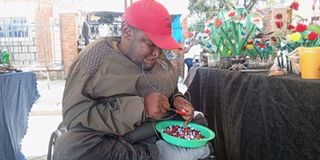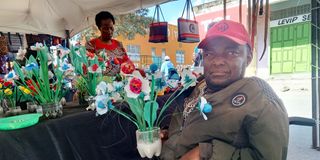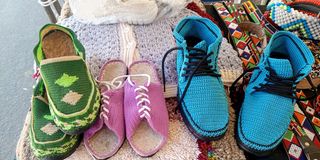Biz Lounge: An entrepreneur who refused to be defined by disability

Francis Kariuki makes his bead bag at his shop on August 11, 2024.
Francis Kariuki was born healthy and grew up playing like other children. However, at the age of three, he was struck by meningitis, which left him disabled.
As he approached school age, his parents chose not to enrol him, leading to nearly 30 years of isolation at home.
Despite his lack of formal education, Kariuki always desired to work and earn a living, but his parents were hesitant to let him leave the house.
"My parents feared I wouldn't be able to find a job on my own, even though I was tired of staying at home and being provided for," he recalls.
One day, Kariuki's sister came home with a handmade Kenyan flag bracelet, sparking his curiosity.

Francis Kariuki displays some of the flowers he sells at his shop on August 11, 2024.
He asked her to show him and studied how it was made. From that moment, he realized he could earn a living and gain his independence.
"I was so fascinated by the bracelet because it was handmade. I studied it without any training and asked my dad to buy me beads and string worth Sh. 300 so I could make bracelets," he notes.
When his dad brought him the materials, Kariuki made his first bracelet, though the design didn't turn out as expected. It wasn't until his third attempt that he succeeded.
After completing the bracelets, he sold them at a nearby shop for Sh. 3,000.
"I was so happy that I had made my own money. I used it to restock beads and continued making bracelets, which allowed me to move out of my parents' home," he reveals.
At the age of 30, Kariuki moved out, despite facing significant discouragement from his family.
To avoid being taken back home, he had to run away and switch off his phone for three months.
Now 39 years old, Kariuki notes that his business has sustained him, and he has never had to beg for money on the streets.
"If I had listened to my family, I would still be at home waiting to be provided for. But now, I'm also teaching others the art of beadwork," he says.
Kariuki's business has expanded to include bracelets, serviette holders, belts, carpets, artificial flowers, and even crochet shoes.

Some of the crocheted shoes that Francis Kariuki has made and sells at his shop on August 11, 2024.
He earns an average of Sh. 6,000 per month, which meets his needs and allows him to reinvest in his business.
Kariuki reveals that he has perfected his craft, with most items taking just one and a half days to complete, though shoes take longer.
His hope is that parents would allow their children with disabilities to explore their talents and support them.
"I hope parents let children with disabilities explore their talents. If my parents had allowed me to get out earlier, I might have achieved even greater things, maybe even started a family," he reflects.
Kariuki's story highlights how people with disabilities (PWDs) have historically missed out on opportunities due to misconceptions, fear, myths, and how one can rise beyond the limitations to achieve great things.


